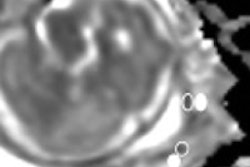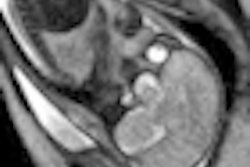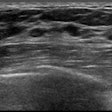A phenomenon known as ultrasound fade -- a gradual loss of energy in the modality as sound waves circulate through tissues -- may be a harbinger of premature birth, according to a new study in Ultrasound in Medicine and Biology.
The study measured signal attenuation and cervical length in 67 African-American women during early gestation from 17 to 21 weeks, and then from 22 to 26 weeks. By 21 weeks, ultrasound already showed differences in signal attenuation in women who would later go on to deliver preterm babies.
As the cervix changes in anticipation of childbirth, ultrasound attenuation changes can provide early tissue-based information, said lead investigator Barbara McFarlin, PhD, an associate professor at the University of Illinois, in a statement.
Delivery before 37 weeks of pregnancy is a leading cause of long-term health problems, accounting for three-fourths of abnormalities such as cerebral palsy and developmental delay. In addition, premature births come with hefty costs approaching $30 billion per year.
The study tested the authors' hypothesis that ultrasound could detect changes in water absorption and collagen as the cervix remodels prior to giving birth, providing a noninvasive way of measuring cervical changes during that period. Currently, measuring the length of the cervix is the only way to predict the risk of preterm delivery (Ultrasound Med Biol, September 2015, Vol. 41:9, pp. 2533-2539).
Although ultrasound at 17 to 21 weeks already showed attenuation differences in those who would go on to deliver early, there were no differences in cervical length between women who would deliver prematurely and those who would deliver on schedule. None of the women had a cervical length of less than 2.5 cm -- a common cutoff threshold used to identify women at risk for premature birth who are candidates for progesterone therapy.
The authors expect that future ultrasound equipment will be able to measure the cervical attenuation differences automatically.



















